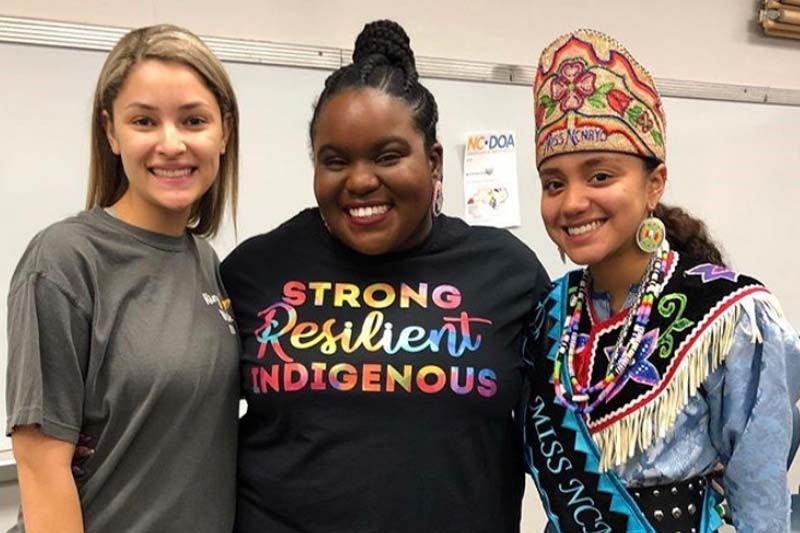Meredith Holds Indigenous Peoples’ Day Speak Out Event
- By By Ashley Graham, ’21, Submitted by the Dept. of History, Political Science, and International Studies
- Published

Did you know that Governor Roy Cooper dedicated the second Monday of October as Indigenous Peoples’ Day in 2017? While most people still know it as Columbus Day, many U.S. states with a large Native American population have replaced it altogether, shifting the focus to the people who lived here long before Columbus and other European explorers arrived. Our very own state, North Carolina, is home to the largest Native American population east of the Mississippi River. The Haliwa-Saponi, Occaneechi Band of the Saponi Nation, Lumbee Tribe of NC, Coharie, Sappony, Waccamaw Siouan, Eastern Band of Cherokee Nation, and Meherrin Nation are the eight tribes recognized by the state of North Carolina.
On October 16, 2019, the Native American Student Association and the History and Politics Club celebrated Native American history with an Indigenous Peoples’ Day Speak Out. As president of both organizations and a Haliwa-Saponi Native American woman herself, Ashley Graham proposed the Speak Out to draw attention to what remains for many a forgotten or misunderstood part of our American story. Students and faculty members read excerpts from Native American poetry, autobiographies, and speeches.
Korey Barringer, treasurer of the Native American Student Association, read a powerful quote from Chief Sitting Bull, a Hunkpapa Lakota Sioux: “I never committed any depredations in the white man’s country. I never made the white man’s heart bleed. The white man came on to my land and followed me. The white men made me fight for my hunting grounds. The white man made me kill him or he would kill my friends, my women, and my children.” Other excerpts centered on themes of injustice, the horrors of colonialism, and the hopes Native Americans have for the future.
Miss North Carolina Native American Youth Organization Ambassador Eden Richardson joined the Speak Out as a special guest. Richardson spoke about her experiences as a young Haliwa-Saponi woman and about how detrimental the veneration of Columbus Day is. Columbus did not “discover” the Americas; in fact, the Americas were inhabited by peoples who archaeologists estimate had been established for between 14,000 and 15,000 years. Further, Columbus and other Europeans were responsible for the deaths of an estimated 90% of Native Americans, primarily through warfare and disease.
In her role as an ambassador, Richardson travels the country to speak about Native American heritage and Eastern Woodland culture. She demonstrated the Jingle dance and wore her Jingle Dress regalia. Jingle dancers must be given permission to wear the dress by a respected elder of a Native community. Richardson’s aunt, an enrolled member of the Lakota Sioux Tribe, gifted her with a Jingle dress at the age of 15. The Jingle dance originates from three different Ojibwa bands: the Red Lake Band of Chippewa, Whitefish Bay, and the Mille Lacs. Richardson’s blue regalia reflects the water element of her astrological sign, contains jingles made out of snuff cans, and includes both Eastern Woodland floral designs and traditional beadwork.
“I feel like the event was a major success,” said Richardson. “Any time I get people’s attention about problems in Indian Country and when they ask questions about those problems, I think we win. They get my answers and spread the word.”
If you missed it this year, the student organizations that sponsored the event plan to celebrate Indigenous Peoples’ Day again in 2020.
Photo information (l to r): Meredith students Chloe Mehring, Ashley Graham, and guest speaker Eden Richardson, Miss North Carolina Native American Youth Organization Ambassador
News Director
316 Johnson Hall
(919) 760-8087
Fax: (919) 760-8330
PRINCETON REVIEW
U.S. NEWS
NICHE
3800 Hillsborough Street Raleigh, NC 27607-5298 | (919) 760-8600 Fax: (919) 760-8330 | © 2024 All Rights Reserved.